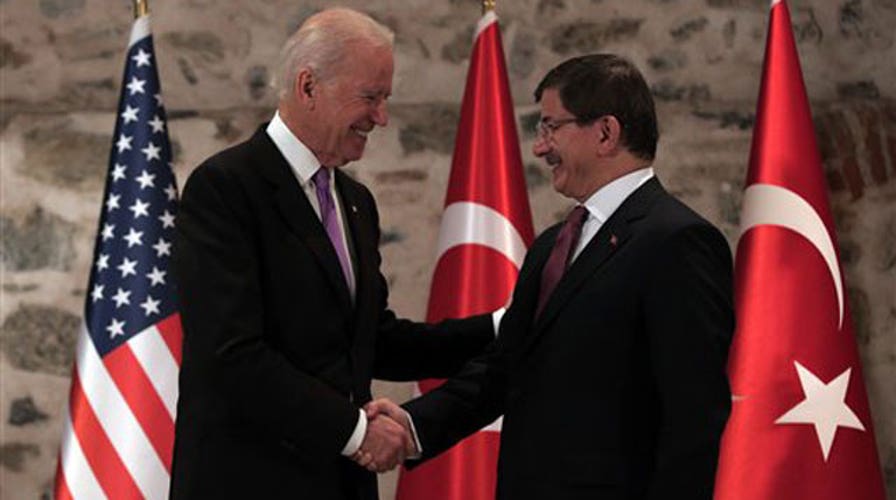US, Turkey making progress toward joint effort against ISIS
Jennifer Griffin reports from Washington, D.C.
The U.S. and Turkey are close to an agreement on a joint military action against the Islamic State militant group in northern Syria, according to a published report.
The Wall Street Journal, citing officials from both countries, reported that the proposed deal would allow the U.S. and its coalition partners access to Turkish air bases to use as launch points for air strikes. The agreement would also provide for a protected zone along part of the Syria-Turkey border that would be off limits to Syrian government aircraft and provide protection for moderate Syrian rebels and refugees fleeing the country's bloody, three-year-long civil war.
Turkey has already agreed to allow 2,000 moderate Syrian rebels to be trained on its own soil, and has sent members of its special forces to northern Iraq to train Kurdish Peshmerga fighters.
The Journal reported that Turkey had proposed a far more extensive no-fly zone over northern Syria, only to be rebuffed by the Obama administration, which said that the proposal would constitute an act of war by the U.S. against the Damascus government of Bashar al-Assad.
“We are in discussions with the Turks. Right now we don’t believe a buffer zone is the best way relieve the humanitarian crisis there in Northern Syria,” Pentagon spokesman Col. Steve Warren said Monday.
U.S. officials told the paper that talks between the two nations were still in a preliminary stage, and a final deal may not be agreed upon for weeks.
Turkish President Recep Tayyip Erdogan met with Vice President Joe Biden in Turkey last week for discussions about the civil war in Syria and the rise of the Islamic State, better known as ISIS. The Al Qaeda-inspired terror group's months-long offensive in northern Syria has helped push between 1.5 million and 1.8 million refugees into Turkey, with millions more arrivals possible.
NATO officials told the Journal that Turkey could justify opening its bases to coalition jets under Article 51 of the U.N. Charter, which provides a right to collective self-defense. Technically, the ongoing strikes in Syria are being carried out in support of operations in Iraq based on Iraqi Prime Minister Haider al-Abadi ’s Article 51 letter invoking collective self-defense.
News of the progress in talks between the U.S. and Turkey comes after Syrian activists said the U.S.-led coalition targeted ISIS' de facto capital of Raqqa in northeastern Syria with as many as 30 airstrikes Sunday.
The Britain-based Syrian Observatory for Human Rights said the strikes also targeted the Division 17 air base, which the ISIS seized earlier this year from Iraqi government forces.
The U.S. military did not confirm the airstrikes to the Associated Press.
The monitoring group, which relies on a network of activists inside Syria, reported at least 30 coalition strikes in all. The Local Coordination Committees, an activist collective, also confirmed the airstrikes. Neither group had casualty figures.
The American-led coalition began targeting ISIS militants in Syria in September, expanding an aerial campaign already hitting the extremist group in Iraq.
Many of the U.S. airstrikes in Syria have targeted ISIS fighters who are attacking the predominantly Kurdish town of Kobani on the Turkish border.
The Observatory said that at least 50 ISIS militants were killed on Saturday and early Sunday in clashes with Kurds and in coalition airstrikes. Eleven Kurdish fighters also were killed, according to the Observatory.
Idris Nassan, a Kurdish official from Kobani, said by telephone that tens of ISIS militants were killed, but he did not have a concrete figure.
IS has been attacking Kobani since mid-September. The militants' offensive has bogged down, and the Syrian Kurds — backed by their Iraqi brethren with heavy weapons — appear to have seized the momentum and to have begun pushing the jihadis back.
The report of the strikes came as a new Pentagon report revealed that the U.S. is conducting roughly 85 percent of the multi-national airstrikes against ISIS in both countries.
U.S. fighter planes and drones have conducted 819 strikes, compared to 157 from the 10 other countries, according to the detailed report obtained last week by FoxNews.com.
The Associated Press contributed to this report.





